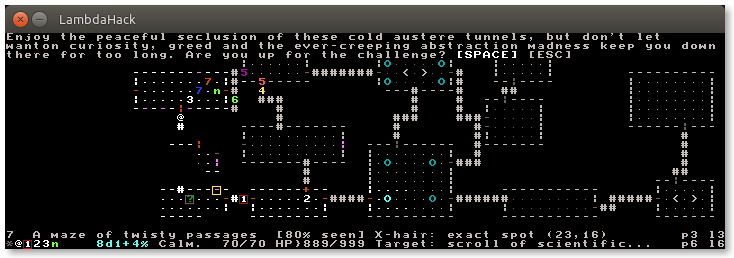LambdaHack: A game engine library for roguelike dungeon crawlers
LambdaHack is a Haskell game engine library for roguelike games of arbitrary theme, size and complexity, packaged together with a little example dungeon crawler. Try out the browser version of the LambdaHack sample game at https://lambdahack.github.io (It runs fastest on Chrome. Keyboard commands and savefiles are supported only on recent enough versions of browsers. Mouse should work everywhere.)

When completed, the engine will let you specify content to be procedurally generated, define the AI behaviour on top of the generic content-independent rules and compile a ready-to-play game binary, using either the supplied or a custom-made main loop. Several frontends are available (SDL2 is the default for desktop and there is a Javascript browser frontend) and many other generic engine components are easily overridden, but the fundamental source of flexibility lies in the strict and type-safe separation of code from the content and of clients (human and AI-controlled) from the server.
Please see the changelog file for recent improvements and the issue tracker for short-term plans. Long term vision revolves around procedural content generation and includes in-game content creation, auto-balancing and persistent content modification based on player behaviour. Contributions are welcome.
Games known to use the LambdaHack library:
Allure of the Stars, a near-future Sci-Fi game, http://hackage.haskell.org/package/Allure
Space Privateers, an adventure game set in far future, http://hackage.haskell.org/package/SpacePrivateers
Note: All modules in this library are kept visible, to let games override and reuse them. OTOH, to reflect that some modules are implementation details relative to others, the source code adheres to the following convention. If a module has the same name as a directory, the module is the exclusive interface to the directory. No references to the modules in the directory are allowed except from the interface module. This policy is only binding when developing the library --- library users are free to access any modules, since the library authors are in no position to guess their particular needs.
[Skip to Readme]
Modules
[Index]
- Game
- LambdaHack
- Game.LambdaHack.Atomic
- Game.LambdaHack.Client
- Game.LambdaHack.Client.AI
- Game.LambdaHack.Client.Bfs
- Game.LambdaHack.Client.BfsM
- Game.LambdaHack.Client.CommonM
- Game.LambdaHack.Client.HandleAtomicM
- Game.LambdaHack.Client.HandleResponseM
- Game.LambdaHack.Client.LoopM
- Game.LambdaHack.Client.MonadClient
- Game.LambdaHack.Client.Preferences
- Game.LambdaHack.Client.State
- Game.LambdaHack.Client.UI
- Game.LambdaHack.Client.UI.ActorUI
- Game.LambdaHack.Client.UI.Animation
- Game.LambdaHack.Client.UI.Config
- Content
- Game.LambdaHack.Client.UI.DisplayAtomicM
- Game.LambdaHack.Client.UI.DrawM
- Game.LambdaHack.Client.UI.EffectDescription
- Game.LambdaHack.Client.UI.Frame
- Game.LambdaHack.Client.UI.FrameM
- Game.LambdaHack.Client.UI.Frontend
- Game.LambdaHack.Client.UI.HandleHelperM
- Game.LambdaHack.Client.UI.HandleHumanGlobalM
- Game.LambdaHack.Client.UI.HandleHumanLocalM
- Game.LambdaHack.Client.UI.HandleHumanM
- Game.LambdaHack.Client.UI.HumanCmd
- Game.LambdaHack.Client.UI.InventoryM
- Game.LambdaHack.Client.UI.ItemDescription
- Game.LambdaHack.Client.UI.ItemSlot
- Game.LambdaHack.Client.UI.Key
- Game.LambdaHack.Client.UI.KeyBindings
- Game.LambdaHack.Client.UI.MonadClientUI
- Game.LambdaHack.Client.UI.Msg
- Game.LambdaHack.Client.UI.MsgM
- Game.LambdaHack.Client.UI.Overlay
- Game.LambdaHack.Client.UI.OverlayM
- Game.LambdaHack.Client.UI.RunM
- Game.LambdaHack.Client.UI.SessionUI
- Game.LambdaHack.Client.UI.Slideshow
- Game.LambdaHack.Client.UI.SlideshowM
- Common
- Game.LambdaHack.Common.Ability
- Game.LambdaHack.Common.Actor
- Game.LambdaHack.Common.ActorState
- Game.LambdaHack.Common.ClientOptions
- Game.LambdaHack.Common.Color
- Game.LambdaHack.Common.ContentDef
- Game.LambdaHack.Common.Dice
- Game.LambdaHack.Common.Faction
- Game.LambdaHack.Common.File
- Game.LambdaHack.Common.Flavour
- Game.LambdaHack.Common.Frequency
- Game.LambdaHack.Common.HighScore
- Game.LambdaHack.Common.Item
- Game.LambdaHack.Common.ItemStrongest
- Game.LambdaHack.Common.Kind
- Game.LambdaHack.Common.KindOps
- Game.LambdaHack.Common.Level
- Game.LambdaHack.Common.Misc
- Game.LambdaHack.Common.MonadStateRead
- Game.LambdaHack.Common.Perception
- Game.LambdaHack.Common.Point
- Game.LambdaHack.Common.PointArray
- Game.LambdaHack.Common.Prelude
- Game.LambdaHack.Common.Random
- Game.LambdaHack.Common.Request
- Game.LambdaHack.Common.Response
- Game.LambdaHack.Common.RingBuffer
- Game.LambdaHack.Common.Save
- Game.LambdaHack.Common.State
- Game.LambdaHack.Common.Thread
- Game.LambdaHack.Common.Tile
- Game.LambdaHack.Common.Time
- Game.LambdaHack.Common.Vector
- Content
- SampleImplementation
- Game.LambdaHack.Server
- Game.LambdaHack.Server.BroadcastAtomic
- Game.LambdaHack.Server.Commandline
- Game.LambdaHack.Server.CommonM
- Game.LambdaHack.Server.DebugM
- Game.LambdaHack.Server.DungeonGen
- Game.LambdaHack.Server.EndM
- Game.LambdaHack.Server.Fov
- Game.LambdaHack.Server.FovDigital
- Game.LambdaHack.Server.HandleAtomicM
- Game.LambdaHack.Server.HandleEffectM
- Game.LambdaHack.Server.HandleRequestM
- Game.LambdaHack.Server.ItemM
- Game.LambdaHack.Server.ItemRev
- Game.LambdaHack.Server.LoopM
- Game.LambdaHack.Server.MonadServer
- Game.LambdaHack.Server.PeriodicM
- Game.LambdaHack.Server.ProtocolM
- Game.LambdaHack.Server.StartM
- Game.LambdaHack.Server.State
- LambdaHack
Flags
Manual Flags
| Name | Description | Default |
|---|---|---|
| vty | switch to the vty frontend | Disabled |
| curses | switch to the curses frontend (not fully supported) | Disabled |
| gtk | switch to the GTK frontend | Disabled |
| sdl | switch to the SDL2 frontend | Disabled |
| with_expensive_assertions | turn on expensive assertions of well-tested code | Disabled |
| release | prepare for a release (expose internal functions and types, etc.) | Enabled |
Use -f <flag> to enable a flag, or -f -<flag> to disable that flag. More info
Downloads
- LambdaHack-0.6.0.0.tar.gz [browse] (Cabal source package)
- Package description (as included in the package)
Maintainer's Corner
For package maintainers and hackage trustees
Candidates
- No Candidates
| Versions [RSS] | 0.1.20080412, 0.1.20080413, 0.1.20090606, 0.1.20110117, 0.1.20110918, 0.2.0, 0.2.1, 0.2.6, 0.2.6.5, 0.2.8, 0.2.10, 0.2.10.5, 0.2.10.6, 0.2.12, 0.2.14, 0.4.9.0, 0.4.99.0, 0.4.100.0, 0.4.101.0, 0.4.101.1, 0.5.0.0, 0.6.0.0, 0.6.1.0, 0.6.2.0, 0.7.0.0, 0.7.1.0, 0.8.0.0, 0.8.1.0, 0.8.1.1, 0.8.1.2, 0.8.3.0, 0.9.3.0, 0.9.3.1, 0.9.4.0, 0.9.4.1, 0.9.5.0, 0.10.2.0, 0.10.3.0, 0.11.0.0, 0.11.0.1 (info) |
|---|---|
| Change log | CHANGELOG.md |
| Dependencies | assert-failure (>=0.1), async (>=2), base (>=4 && <99), base-compat (>=0.8.0), binary (>=0.8), bytestring (>=0.9.2), containers (>=0.5.3.0), deepseq (>=1.3), directory (>=1.1.0.1), enummapset-th (>=0.6.0.0), filepath (>=1.2.0.1), ghc-prim, ghcjs-dom (>=0.2), hashable (>=1.1.2.5), hsini (>=0.2), keys (>=3), LambdaHack, miniutter (>=0.4.5.0), pretty-show (>=1.6), random (>=1.1), sdl2 (>=2), sdl2-ttf (>=1 && <2), stm (>=2.4), template-haskell (>=2.6), text (>=0.11.2.3), time (>=1.4), transformers (>=0.4), unordered-containers (>=0.2.3), vector (>=0.10), vector-binary-instances (>=0.2.3.1), zlib (>=0.5.3.1) [details] |
| License | BSD-3-Clause |
| Author | Andres Loeh, Mikolaj Konarski |
| Maintainer | Mikolaj Konarski <mikolaj.konarski@funktory.com> |
| Category | Game Engine, Game |
| Home page | https://lambdahack.github.io |
| Bug tracker | http://github.com/LambdaHack/LambdaHack/issues |
| Source repo | head: git clone git://github.com/LambdaHack/LambdaHack.git |
| Uploaded | by MikolajKonarski at 2017-05-29T17:10:46Z |
| Distributions | Arch:0.11.0.1, Debian:0.9.5.0, LTSHaskell:0.11.0.1, NixOS:0.11.0.1 |
| Reverse Dependencies | 2 direct, 0 indirect [details] |
| Executables | LambdaHack |
| Downloads | 30684 total (76 in the last 30 days) |
| Rating | 2.25 (votes: 2) [estimated by Bayesian average] |
| Your Rating | |
| Status | Docs uploaded by user [build log] All reported builds failed as of 2017-05-29 [all 2 reports] |


